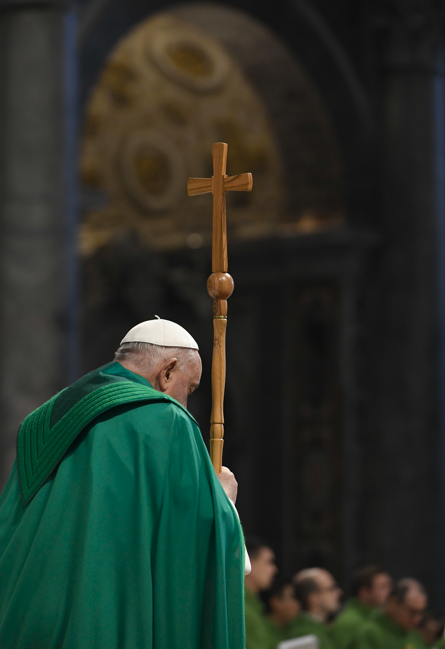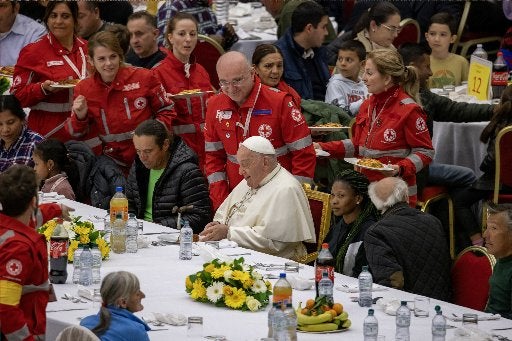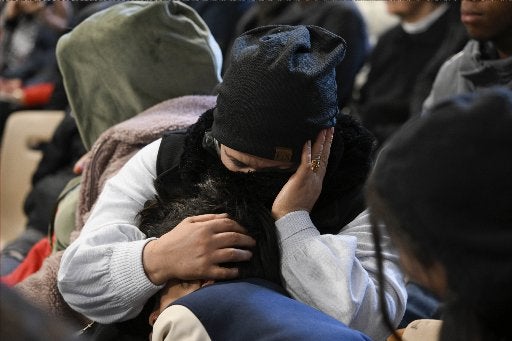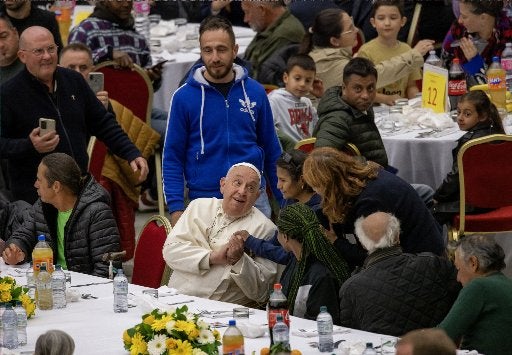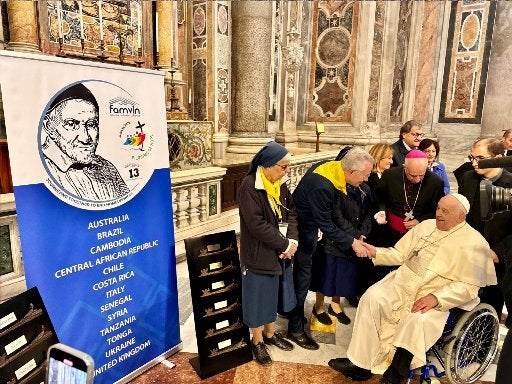VATICAN CITY (CNS) — A Christian faith that does not disturb the powers that be and cannot generate a serious commitment to charity becomes an innocuous devotion, Pope Francis said.
“Christian hope, fulfilled in Jesus and realized in his kingdom, needs us and our commitment, needs our faith expressed in works of charity, needs Christians who do not look the other way,” the pope said Nov. 17, celebrating Mass for the World Day of the Poor in St. Peter’s Basilica.
“We are the ones that must make his grace shine forth through lives steeped in compassion and charity that become signs of the Lord’s presence, always close to the suffering of the poor in order to heal their wounds and transform their fate,” he said.
Making an appeal to the entire Catholic Church, all world governments and international organizations, the pope said, “Please, let us not forget the poor.”
“While one part of the world is condemned to live in the slums of history, while inequalities grow and the economy punishes the weakest, while society devotes itself to the idolatry of money and consumption, it so happens that the poor and marginalized have no choice but to continue to wait,” he said.
After praying the Angelus with those gathered in St. Peter’s Square, Pope Francis highlighted the church in Italy’s Day of Prayer for Victims and Survivors of Abuse Nov. 18. “Every abuse is a betrayal of trust and a betrayal of life. Prayer is indispensable for rebuilding trust.”
The pope then joined some 1,300 people invited to the Vatican audience hall to share lunch. The Italian Red Cross sponsored the meal, and its marching band provided entertainment. The Vincentian Fathers provided each of the pope’s guests with a backpack containing food and hygiene items to take home.
At the Mass, attended by men and women experiencing poverty and those assisting them, the pope focused his homily on “two realities always at war upon the battlefield of our hearts: anguish and hope.”
“Feelings of anguish are widespread in our age, given that social media amplifies problems and wounds, making the world more insecure and the future more uncertain,” he said.
But, he said, by looking at the very real problems of famine, the horrors of war and the deaths of the innocent, “we run the risk of falling into despondency and failing to recognize the presence of God within the drama of history” and condemning “ourselves to powerlessness.”
There is a risk of slipping “into the resigned way of thinking of those who, moved by convenience or laziness, think ‘that’s life’ and ‘there is nothing I can do about it.’ Thus, Christian faith itself is reduced to a harmless devotion that does not disturb the powers that be and is incapable of generating a serious commitment to charity,” the pope said.
Yet it is precisely amid darkness and despair “that Jesus kindles hope,” opening the horizon so that “we may learn to grasp the presence of God’s love, which comes close to us, does not abandon us, and acts for our salvation,” he said.
Christians “can and must enkindle lights of justice and solidarity even as the shadows of our closed world deepen,” he said.
“Our faith should lead us to open our eyes to the sufferings of the world and the misfortunes of the poor, and so exercise the very compassion of Jesus Christ,” he said, asking the faithful to reflect on whether their hearts are moved to look at, touch and concretely help those experiencing difficulty or if they prefer to look away.
“The Christian faith must generate in us a ‘mysticism with open eyes,’ not a spirituality that flees from the world,” he said.
The Catholic Church is not separate from the poor “as if the church existed as an independent reality that must then care for the poor,” Pope Francis said. “The reality is that we become the church of Jesus to the extent that we serve the poor.”
The pope encouraged the faithful also to pay attention to how they live each day, being attentive to their lifestyle and the environment, and to “a tenacious pursuit of justice, dedication to sharing our goods with those who are poorer and the social and political commitment to improving reality around us.”
Before the Mass, the pope blessed 13 bronze keys as a symbolic gesture of his support of the “13 Houses Jubilee Project,” which is aimed at alleviating homelessness around the world.
The Famvin Homeless Alliance, a network of religious orders and charitable organizations inspired by St. Vincent de Paul, said the 13 keys represent 13 countries where they will promote housing solutions during the Holy Year 2025.
The “13 Houses Campaign” has housed and helped over 10,000 people in 70 countries since 2018 and it hopes its jubilee campaign will encourage more communities to become involved.
As part of marking the World Day of the Poor, the Vatican extended the hours of its free medical clinic in St. Peter’s Square for the week, offering physical exams, vaccinations and blood tests to anyone in need with the help of volunteer doctors, nurses and lab technicians.

